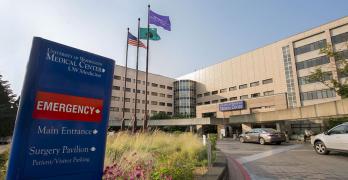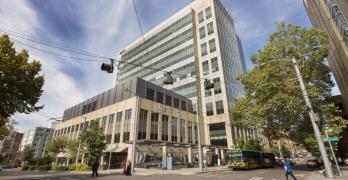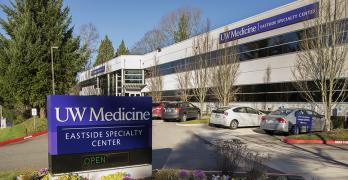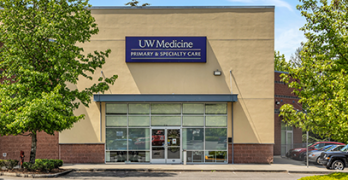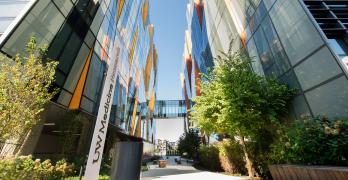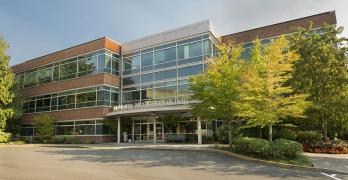Heart Institute
Put your heart in our hands for comprehensive, expert care

World-renowned, team-based heart care you will ♥️.
Our acclaimed team of clinicians are pioneers in groundbreaking treatments of complex heart problems and experts in cardiothoracic surgery. As a leading clinical trial participant, UW Medicine is at the forefront of innovating technology and advancing more effective treatments for your heart. With readily available appointments, multiple locations and one-time registration, we are here to help you get the care you need right away.
Learn about our cardiac specialties
Advanced Heart Failure & Transplant
Our advanced heart failure and transplant specialists are recognized for treating all stages of a weakening heart--performing the most advanced procedures and treatment options in the country.
Adult Congenital Heart Disease
Our team of adult congenital heart disease specialists have specialized training and experience treating patients born with a congenital heart defect — a condition that requires lifelong care.
Cardiac Surgery
Our team of cardiovascular surgeons are recognized for treating a broad variety of cardiac diseases and performing some of the most advanced procedures in the Pacific Northwest.
Cardiac Electrophysiology
Our cardiac electrophysiology specialists use state-of-the-art technologies and therapies to give you the expert care needed to manage heart rhythm issue.
General Cardiology
There are many kinds of heart problems, from structural to electrical. Our cardiologists treat all types of cardiac issues and help you maintain cardiac wellness.
Interventional Cardiology
Our interventional cardiovascular specialists deliver heart defect expertise with unmatched results. Our team of experts are leaders in much of the research that has brought these therapies to use.
Some of our common services:
When a person has had a heart problem since birth, they need special, appropriate care. Our adult congenital heart disease specialists have the in-depth understanding and expertise required to provide the right care.
Certain cancer treatments can damage the heart and blood vessels, especially when a person is already at risk for heart disease. The specialists at the Cardio-Oncology Clinic at UW Medical Center's Regional Heart Center are experts in decreasing cardiovascular damage in cancer patients and reducing the long-term risk of developing cardiovascular disease in cancer survivors.
People who should be referred to this clinic include:
- Patients with significant cardiovascular history who need to undergo cancer treatment.
- Patients who present with heart failure following traditional treatments associated with cardiac dysfunction including anthracyclines, radiation, and newer agents like kinase inhibitors.
- Patients who had cancer treatment in the past and develop new-onset cardiac problems.
- Patients with a history of radiation therapy and who need surgical or interventional treatments.
Calcium scoring is a non-invasive CT exam that measures the amount of calcified plaque in arteries. This information is used to calculate the risk of coronary disease, such as heart attack or stroke. This test is especially relevant for people between the ages of 40-70 who have high blood pressure, a history of smoking, diabetes, high cholesterol or a family history of heart disease.
This area of cardiology deals with treating electrical problems of the heart and abnormal heartbeats, called arrhythmias. Our electrophysiology specialists will give you the expert care you need to manage a heart rhythm problem. They use state-of-the-art technologies and therapies often not available elsewhere in the Northwest.
An arrhythmia is an abnormal heart rhythm. The heart beats too quickly, too slowly or with an irregular pattern. In any of these situations, the body's vital organs may not receive enough blood to meet their needs. Our electrophysiology specialists can help keep your heart beating normally.
Also called “AFib,” this is the most common type of arrhythmia. People with AFib experience a quivering or irregular and often fast heartbeat. If you’re diagnosed with AFib, speak with our UW Medicine electrophysiology team. We’ll figure out the best treatment for you and your heart.
When evaluating for cardiac problems, care providers frequently request diagnostic testing to gather more information about specific cardiac or vascular disease symptoms. These tests include:
-
Treadmill or pharmacologic cardiac stress testing with nuclear perfusion imaging
-
Transthoracic and stress echocardiography with contrast enhancement
-
Arterial ultrasound testing including carotid, subclavian, renal, mesenteric, and lower extremity peripheral examinations
-
Abdominal aortic ultrasound
-
Ankle-brachial index testing with exercise
-
Pacemaker and cardiac device interrogation
-
Ambulatory Holter Monitor
-
“King of Hearts” Monitor
Cardiac rehabilitation is a proven, evidence-based practice that has been shown to improve outcomes for cardiac patients by teaching positive health choices.
If you've had a heart attack or suffer from another cardiac condition, UW Medical Center - Northwest's Cardiac Rehabilitation Program can help support recovery, reduce risk for further cardiovascular disease, and increase overall health and well-being.
Patients enrolled in the program participate in specialized exercise sessions supervised by critical care nurses and exercise physiologists, and a cardiologist is on call during all sessions. Patients also take classes that help them reduce cardiac risk factors and make important lifestyle changes.
Our Cardiac Rehabilitation Program has operated for 20 years, is certified by the American Association of Cardiovascular and Pulmonary Rehabilitation, and is located in the state-of-the-art Cardiac Fitness Center at UW Medical Center - Northwest. A referral from a physician is required to enroll in the program.
Not all heart problems need surgery. But sometimes it is the best treatment, or is needed when other treatments don’t work or can't be used. Our heart surgeons are well known experts in fixing heart problems surgically, with a patient survival rate nearly two times higher than the national average.
There are healthy people who are susceptible to heart and blood vessel diseases because these diseases run in their families. The specialists at our Cardiovascular Genetics Clinic at the Regional Heart Center are experts in evaluating and managing the care of people who may have inherited a cardiovascular disease.
Clinical trials are used to study and test the safety and effectiveness of medical treatments, devices and drugs. Clinical trials are also used to find better treatments and cures. Our heart care experts are renowned leaders in clinical trials, dedicated to discovering better ways to prevent, treat and cure heart disease.
An electrocardiogram, or EKG, measures the electrical activity of the heart and can be used to check for signs of heart disease.
The health of your heart and blood vessels are vital to your total health. Your heart’s built-in electrical system conducts electrical impulses that trigger the heart to beat and pump blood at a regular pace, and your heart’s valve system opens and shuts to let blood flow through your heart and into your body through your blood vessels.
There are many kinds of heart problems. Diseases of the blood vessels are the most common cause of heart attack, but other conditions can affect the heart’s valves or its electrical system too. Our heart care experts are excellent at treating all kinds of heart problems.
When the heart has trouble pumping blood, the body receives less blood than it needs. Our heart failure specialists are experts at using a variety of treatments to help people who have weak hearts.
Heart transplant is the last resort for people with heart failure. Although heart transplant surgery presents risks, it is life-saving for many people. In 2017, UW Medicine performed 75 heart transplants—one of the highest numbers in the U.S., and more than anywhere in the Pacific Northwest. While the national average for survival rates is 11 years, half of our heart transplant patients are still alive after 17 years.
HCM is the most common inherited heart disorder. The heart muscle becomes abnormally thick, which makes it harder to fill and pump blood. Our HCM specialists are experts in managing the conditions that cause or contribute to the disease, and in helping patients live as normally as possible.
This area of cardiology uses minimally invasive procedures to treat heart problems. These procedures—such as balloon angioplasty and coronary stenting—result in fewer complications and less heart pain, or angina, and can be lifesaving if you are having a heart attack. Our interventional cardiologists are experts at using the latest techniques and technologies found in only a few hospitals across the U.S.
Inform yourself to make the best choices for your heart health and cardiovascular care with our patient education resources.
Support is an important part of your care beyond treatment. Support groups and community resources can help you and your loved ones through your medical journey and recovery.
This refers to defects in the heart’s valves, wall or chambers. These defects can develop over time due to aging, infection or an underlying condition. Our structural heart disease specialists deliver heart defect expertise with unmatched results, and we have been leaders in much of the research that has brought these therapies to use.
Aortic stenosis is a structural heart disease in which the valve in the aorta cannot open and close normally. This decreases the heart’s blood flow to the body. Medicines can’t manage the symptoms of aortic stenosis, and the only cure is replacing the aortic valve.
Treating patients with failed prosthetic valves is a challenge. The specialists at our Prosthetic Heart Valve Consult Clinic at the Regional Heart Center are experts at providing the safe, effective care these patients need. The clinic is the only one of its kind in the Pacific Northwest and one of a few in the world.
Convenient care, in your neighborhood.
Heart Institute at UW Medical Center – Montlake
Medical Specialties
Hours Today
Appointments
Heart Institute at Harborview
Medical Specialty
Hours Today
Appointments
Heart Institute at Eastside Specialty Center
Medical Specialty
Hours Today
Appointments
Heart Institute at Mountlake Terrace
Hours Today
Appointments
Heart Institute at South Lake Union
Medical Specialty
Hours Today
Appointments
Heart Institute at UW Medical Center – Northwest
Medical Specialty
Hours Today
Appointments
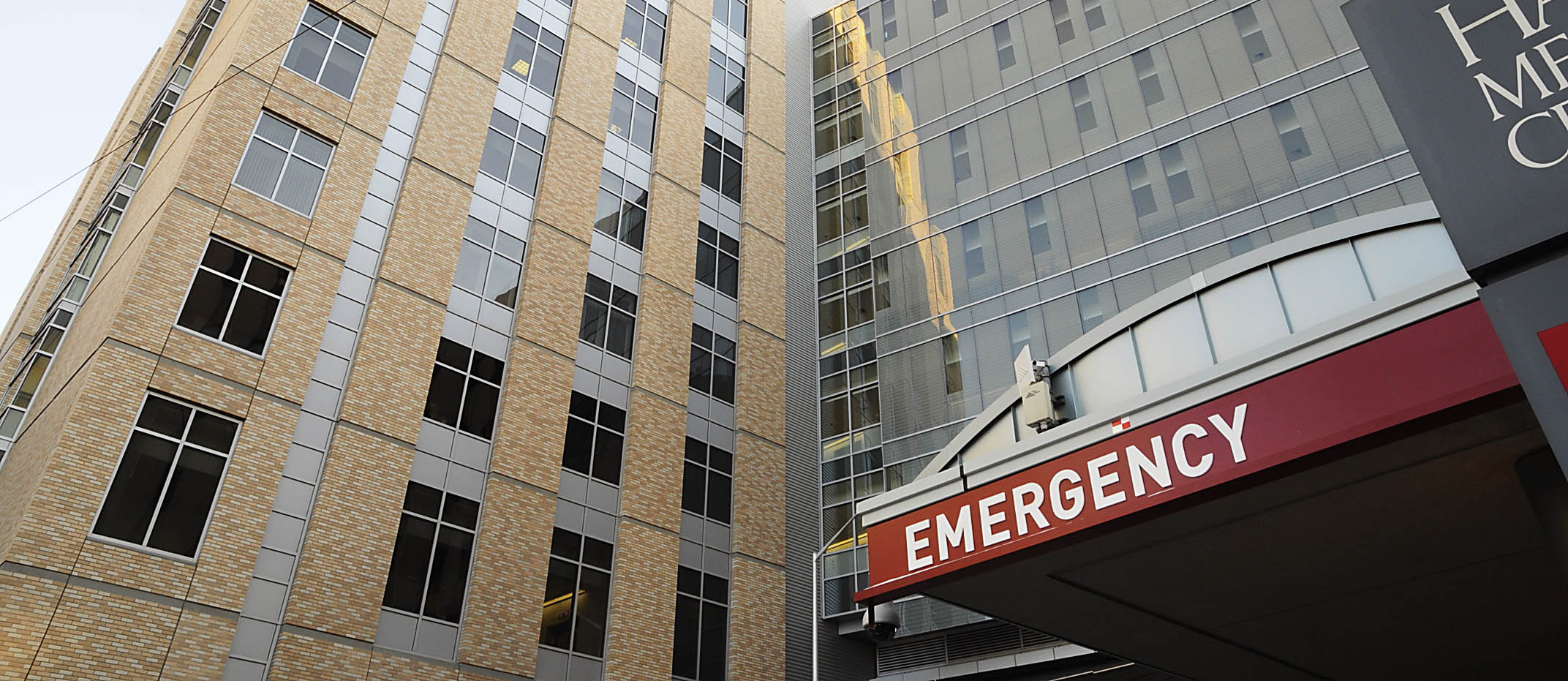
Should I go to the emergency room or urgent care?
If you have an illness or injury that you think may be life-threatening without immediate care, call 911 or go to the nearest emergency room.
If you have an illness or injury that is not life-threatening but needs attention today, go to urgent care.

